- There are no more items in your cart
- Shipping Calculated at checkout
- Sub-Total (inc. VAT) £0.00
Need Help?
Anti-Corrosive Primers
Prepare metal surfaces properly to protect them in corrosive environments using anti corrosion primers at Rawlins Paints. Suitable for steel, galvanising, stainless steel, cast iron, light alloys, and other metal surfaces that require corrosion protection. Use the sidebar to filter products by key attributes and features - product type (epoxy, etc), drying/recoat times, single pack and two component, high solids - required for your project. Our anti corrosion primers provide long term protection in C1-C5 corrosive environments in a wide range of industrial applications - click for more info.
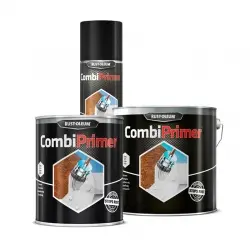
Rust-Oleum 3369/3380 CombiPrimer Anti-Corrosion
Available in grey and red, can or aerosol. Two-pack anti-rust primer for new or slightly rusted surfaces. For steel surfaces, provides and enhance protection against corrosion. Recoatable after 2 hours; fast drying and lead- and chromate-free. 5-year shelf life if stored properly.
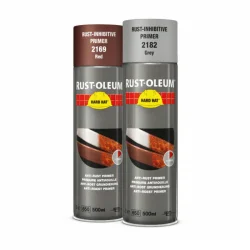
Rust-Oleum Hard Hat 2169/2182 Anti-Rust Primer
Available in Red-Brown and Grey. For new, bare, or slightly rusted steel surfaces. Touch dry in 15 minutes, ready to handle in 30. Lead and chromate-free. Can be recoated within 1 hour.

Coo-Var Red Oxide Metal Primer
In matt red. General-purpose metal primer. For ferrous metals such as iron and steel. Strong adhesion and protection from rust.Please note: 200L is subject to a longer lead time and a MOQ of 4.
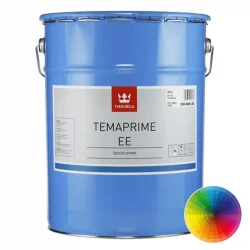
Tikkurila Temaprime EE
Tikkurila Temaprime EE is a fast drying, one-component anti-corrosive special primer. Its recommended uses include both new and maintenance painting of containers, agricultural machinery and other steel structures.Huge colour range available. Adheres extremely well to different kinds of substrates, such as steel, aluminium and zinc....
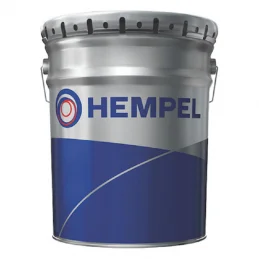
Hempel Uniprimer 13140
Hempel's Uniprimer 13140 is recommended as a versatile primer on steel and metal surfaces for Hempalin or Hempatex in mild to medium corrosive atmospheric environment, giving the opportunity to reduce the number of primers for maintenance.For professional use only Quick-drying with rust inhibiting pigments, can be applied in low film...
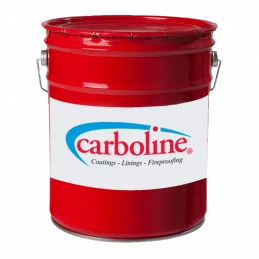
Carboline Carbocoat 115
Carboline Carbocoat 115 is a fast-drying steel primer that provides corrosion protection on structural steel. Well suited for fabrication shops that need fast cure to dry and handle times.Rapid cure and fast-drying VOC compliant for most areas Good for filling properties on rough and pitted steel
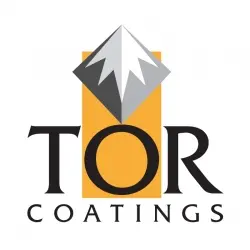
Tor Hi Build Zinc Phosphate Primer
A single pack high build primer for blast/manually cleaned steel. An excellent lead and chromate-free anticorrosive.Protective primer for steel A urethane alkyd binder with zinc phosphate anti-corrosive, together with inert inorganic pigments and thinned with low aromatic white spirit Good coverage - 6.45 square metres per litre Applies...
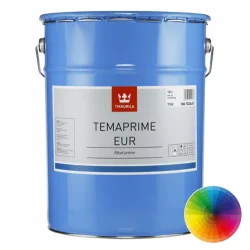
Tikkurila Temaprime EUR
Tikkurila Temaprime EUR is a fast-drying, one-component anti-corrosive economical alkyd primer. Recommended for steel structures, agricultural, construction and other machinery.Huge colour range available. An excellent choice for use in assembling plants and painting stations with rapid production cycles. The product has MED (Marine...
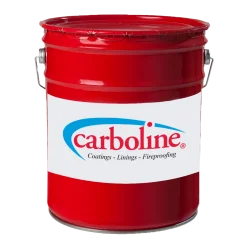
Carboline Carboguard 893
Carboline Carboguard 893 is a two-component, high solids corrosion resistant primer or intermediate coat over steel and inorganic zinc primers.Excellent corrosion protection Excellent film build and edge protection Can be top coated with a broad variety of high performance finish coats Used as a primer or an intermediate coating Good...
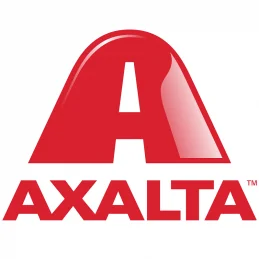
Axalta ViterPrime VRP Primer
Axalta ViterPrime VRP Primer is a single pack, fast setting specialist compliant alkyd primer for steel surfaces. Specially designed for overcoating with ViterLac TF95 and other high performance gloss finishes.High performance Specially designed for overcoating with high gloss, high performance topcoats Dry to overcoat from...
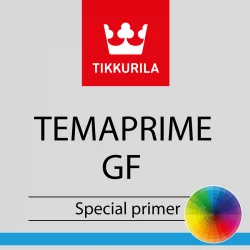
Tikkurila Temaprime GF
Tikkurila Temaprime GF is a fast-drying one-component anti-corrosive pigmented special primer. Recommended uses include haulage equipment, agricultural, construction and other machinery.Huge colour range available Primer for steel, aluminium and zinc surfaces Recoatable also with polyurethane paints Excellent anti-corrosive properties...
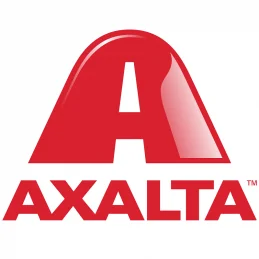
Axalta ViterPrime EA Primer
Axalta ViterPrime EA Primer is a fast air drying, modified epoxy ester single pack primer for the ACE market.Fast air drying or force drying, with good corrosion resistance Touch dry in 20mins at 23°C Excellent adhesion For steel substrates Suitable for application by airless or conventional spray Specially designed for the coating...
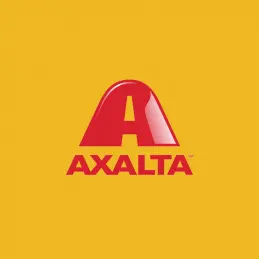
Axalta ViterCoat GF Primer
Axalta ViterCoat GF Primer is a two pack epoxy primer for the ACE market.Fast air drying or force dried with good corrosion resistance Designed for overcoating with a range of standard Axalta Coating Systems topcoats Suitable for application by airless or conventional spray Excellent adhesion to thoroughly degreased mild steel, blast...

Resimac Resichem 506 Aluprime
Resichem 506 Aluprime is a solvent based epoxy coating designed for the long term protection of steel and concrete structures against corrosion. The coating can be applied to mechanical or abrasive blast clean surfaces and will cure at temperatures as low as 5˚C. Can be applied in a single coat or as a 2 coat system to properly prepared...

Resimac 509 MCU 125
Resichem 509 MCU 125 is a solvent based urethane primer (single component). The primer is a moisture cured coating ideal for priming previously coated and metallic surfaces. The coating is compatible with any of the Resimac polyurethane based chemical & corrosion coatings and the UV stable top coat products. For professional use only...
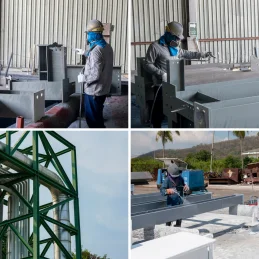
Resimac Resichem 510 MCU 126
Resichem 510 MCU 126 is a solvent based urethane primer (single component) with an extended overcoating window of 7 days. The primer is a moisture cured coating ideal for priming previously coated and metallic surfaces. The coating is compatible with any of the Resimac polyurethane based chemical & corrosion coatings and UV stable top coat...
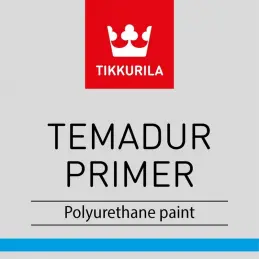
Tikkurila Temadur Primer
Tikkurila Temadur Primer is a two-component matt polyurethane primer containing anti-corrosive pigments, hardener aliphatic isocyanate. Recommended for painting of haulage equipment, storage tank exteriors and other steelwork, machinery and equipment.Forms a smooth and dense substrate for the subsequent paint layer Used as a primer in...
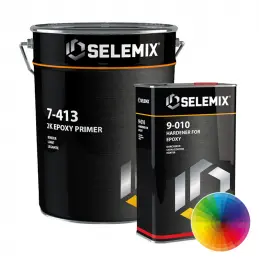
Selemix 7-413 2K Epoxy Primer
Tintable primer with 6,700+ colours and a fast drying time for use in a wet on wet system when recoated with 2K Topcoats.For use on Steel, Cast Iron, Aluminium, Light Alloys, GRP & Previously Painted Surfaces Good anticorrosive properties - Suitable for the finishing and protection of machinery, agricultural & construction...
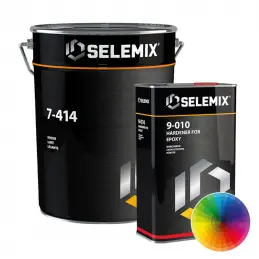
Selemix 7-414 2K Epoxy Vinyl Primer
We no longer stock this product, but can recommend Selemix 7-413 2K Epoxy Primer as a great alternative. Please note: it is important to check that any alternative product is suitable for your requirements, as our suggestion is given in good faith but without warranty. If you are in any doubt please first contact our technical team on 0113...
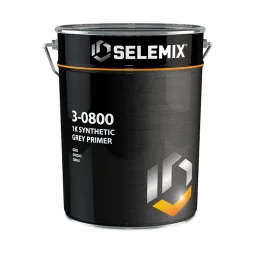
Selemix 3-0800/3-0801 1K Synthetic Primer
One-pack fast drying synthetic anti-rust primer with good adhesion on bare steel. For agricultural and building site machinery, carpentry and items made of ferrous metal.Compatible with all Selemix 1K Topcoats and 2K Polyurethane and Acrylic Topcoats Also suitable for use on Painted Surfaces and Polyurethane or Polyester Fillers...

Owatrol CIP Corrosive Inhibiting Primer
Anti-corrosive primer that possesses the penetrating properties of Owatrol Oil. May be overcoated with any coating without the risk of it dissolving. For new and rusted horizontal and vertical surfaces. Ferrous and non-ferrous metals, steel superstructures, motor vehicles. Civil engineering and marine equipment, railings, gates, nautical...
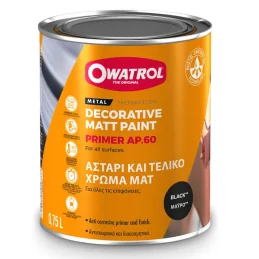
Owatrol AP60 Anti-Corrosive Primer
Exceptional anti-corrosion protection and weather resistance for new or rusted metal, in 4 colours. For ferrous and non-ferrous metals – galvanised, aluminium, zinc, copper and more. Fencing, railings, garden furniture, porches, various metal structures, doors, frames, radiators, pipes, machinery, tiles and more. Can also be used on...
Need Help?
Need Help?
Anti-corrosive primers are critical in safeguarding metal substrates from the devastating effects of corrosion, which can lead to significant structural damage, financial loss, and operational disruption. Metals, particularly steel, are highly vulnerable to corrosion when exposed to moisture, oxygen, salt, and industrial chemicals. Without proper protection, metals can rust, deteriorate, and weaken, compromising the safety and functionality of equipment and structures. Anti-corrosive primers offer an essential solution by forming a protective barrier between the metal surface and corrosive elements, thereby extending the lifespan of assets across a broad range of industries. These specialist primers are used on everything from pipelines and storage tanks to machinery, bridges, and structural steel, ensuring long-term protection in both mild and highly aggressive environments.
Top Features of Anti-Corrosive Primers
Epoxy Primers
Epoxy primers are renowned for their exceptional adhesion, mechanical strength, and chemical resistance. They are widely used in industrial applications where metal surfaces are exposed to harsh conditions, such as oil and gas facilities, chemical plants, and offshore platforms. Epoxy-based anti-corrosive primers are ideal for protecting steel, aluminium, and other non-ferrous metals from moisture and aggressive chemicals. Their robust performance makes them a top choice for protecting process equipment, internal and external storage tanks, pipelines, and heavy machinery. Epoxy primers are also commonly used on agricultural and construction vehicles (ACE), ensuring long-term corrosion protection for equipment exposed to rain, mud, and chemicals in rural and industrial environments.
Alkyd Primers
Alkyd-based anti-corrosive primers are solvent-borne coatings that provide good resistance to weathering and moisture in environments with low to moderate corrosive risks (C1-C3). These primers dry quickly and are often used for exterior steel structures like stairways, sheet piles, and machinery where fast turnaround times are necessary. While alkyd primers do not offer the same level of chemical resistance as epoxy systems, they are more economical and easier to apply, making them ideal for maintenance and touch-up projects. In the agricultural and construction sectors, alkyd primers are frequently used on haulage equipment and steel containers, offering efficient corrosion protection where exposure to aggressive chemicals is limited.
High Solids Primers
High solids primers are designed to deliver a thicker protective layer with fewer coats, reducing drying times and overall application costs. These primers contain a higher concentration of resin and less solvent, which allows for greater film build in a single application. High solids anti-corrosive primers are particularly effective in highly corrosive environments (C4-C5), such as coastal areas, industrial plants, and chemical processing facilities. Their ability to protect structural steel, transformers, and pump casings from severe environmental conditions makes them a reliable choice for projects requiring long-term corrosion protection with minimal maintenance. High solids primers are also favoured for protecting steel bridges and haulage equipment that are exposed to road salts, rain, and pollutants.
Single-Pack vs Two-Component Systems
Single-pack anti-corrosive primers offer convenience, as they come pre-mixed and ready to use straight from the container. These primers are commonly used in smaller applications or environments with lower levels of corrosive exposure, such as C1-C3 environments. Single-pack primers are often applied on machinery and internal storage tanks that are shielded from harsh outdoor conditions. On the other hand, two-component (or two-pack) primers require mixing of two components—a resin and a hardener—prior to application. Two-component primers offer superior corrosion resistance and durability, making them indispensable for high-risk environments (C4-C5), such as offshore platforms, pipelines, and structural steel in industrial settings. While two-component systems take longer to apply and cure, their enhanced performance justifies the additional effort, especially when long-term protection is a priority.
Fast Drying and Recoat Times
In industries where equipment must remain operational and downtime is costly, fast-drying anti-corrosive primers are critical. Alkyd-based primers, in particular, dry quickly and allow for rapid recoating, which is advantageous for maintenance projects in sectors like construction and agriculture. These fast-drying primers are frequently used on equipment such as haulage trucks, sheet piles, and stairways, where the ability to quickly return assets to service is essential. However, in applications where long-term corrosion resistance is the primary concern, slower-drying epoxy or high solids primers may be preferred due to their superior durability.
Zinc-Rich Primers
Zinc-rich anti-corrosive primers are widely used in environments where metal substrates are exposed to high levels of moisture, salt, and industrial chemicals. These primers contain a high percentage of zinc, which acts as a sacrificial anode—corroding in place of the steel, thus providing cathodic protection. Zinc-rich primers are ideal for use on structural steel, pipelines, bridges, and sheet piles in corrosive environments such as marine, coastal, and heavy industrial settings (C4-C5). These primers are highly effective in preventing rust creep and ensuring the longevity of the protective coating system, making them a preferred choice in infrastructure and heavy-duty construction projects.
Surface Preparation and Adhesion
One of the most important features of anti-corrosive primers is their ability to adhere to the metal surface, creating a strong bond that enhances the performance of the entire coating system. Proper surface preparation is key to ensuring maximum adhesion and corrosion resistance. Sandblasting or mechanical cleaning is often required to remove rust, mill scale, and contaminants before applying the primer. Anti-corrosive primers are formulated to adhere well to clean metal surfaces, providing a foundation for subsequent topcoats. This makes them essential for protecting equipment and structures in industries like oil and gas, marine, and construction, where the integrity of the coating system is paramount.
Benefits of Anti-Corrosive Primers
Long-Term Corrosion Protection
The primary benefit of anti-corrosive primers is their ability to provide long-term protection against rust and corrosion, significantly extending the lifespan of metal substrates. In industries where equipment and structures are exposed to moisture, chemicals, and harsh environmental conditions, these primers are indispensable. For example, agricultural machinery, such as tractors and ploughs, are exposed to rain, soil, and fertilisers, all of which can promote corrosion. By applying a specialist anti-corrosive primer, the equipment is protected, ensuring years of reliable operation and reducing the need for costly repairs or replacements.
Durability and Resistance to Wear
Anti-corrosive primers not only protect against corrosion but also offer enhanced durability and resistance to physical wear. This is particularly important for machinery and equipment that undergo heavy use, such as earthmoving vehicles, pump and valve casings, and process equipment. In these applications, the primers must withstand mechanical impacts, vibrations, and abrasion, while continuing to provide corrosion protection. Epoxy-based primers, with their high mechanical strength, are especially suited for these environments.
Reduced Maintenance Costs
By preventing corrosion and reducing the rate of wear on metal surfaces, anti-corrosive primers can significantly reduce maintenance costs over the long term. This is particularly beneficial in industries like haulage, where trucks, trailers, and other vehicles are subject to harsh conditions, including exposure to road salt, rain, and pollutants. Without adequate protection, rust can quickly compromise the integrity of these vehicles, leading to expensive repairs and prolonged downtime. Anti-corrosive primers help mitigate these risks, ensuring that assets remain in service for longer with fewer maintenance interventions.
Resistance to Chemicals and Moisture
Anti-corrosive primers provide excellent resistance to a wide range of chemicals, solvents, and oils, making them essential in industrial environments where exposure to aggressive substances is common. For example, pipelines that transport oil, gas, or chemicals are constantly exposed to corrosive agents both internally and externally. Applying an anti-corrosive primer ensures that the pipeline remains protected from corrosion, even in harsh environments. Similarly, internal and external storage tanks used in chemical processing plants benefit from the protective barrier that anti-corrosive primers provide, preventing the tanks from deteriorating over time.
Adaptability to Various Environmental Conditions
One of the key advantages of anti-corrosive primers is their adaptability to different environmental conditions, ranging from mild indoor environments to highly aggressive outdoor and industrial settings. Anti-corrosive primers are classified for use in corrosive environments ranging from C1 (very low risk) to C5 (very high risk). For example, equipment used in an agricultural setting (C2) may only require a basic alkyd primer to protect against moisture, whereas equipment used in an offshore oil platform (C5) would require a high-performance zinc-rich or epoxy primer to withstand exposure to saltwater and industrial chemicals.
Versatility Across Multiple Applications
Anti-corrosive primers are used across a wide range of industries and applications, providing protection for everything from pipelines and storage tanks to bridges and structural steel. In the construction industry, anti-corrosive primers are applied to steel beams and stairways, ensuring that these critical components are protected from rust and degradation during and after installation. Similarly, in the oil and gas industry, anti-corrosive primers are used on process equipment, pump and valve casings, and pipelines to prevent corrosion in environments where exposure to chemicals, moisture, and high temperatures is common.
Environmental and Regulatory Compliance
Anti-corrosive primers are designed to meet strict environmental and regulatory standards, particularly in industries such as marine, oil and gas, and construction, where environmental impact is a concern. Many modern primers are formulated to be low in volatile organic compounds (VOCs), reducing the release of harmful emissions during application and ensuring compliance with environmental regulations. This is particularly important in industries that operate in sensitive environments, such as coastal areas or near bodies of water, where environmental protection is a priority.
Common Uses of Anti-Corrosive Primers
Agriculture, Construction, and Earthmoving (ACE) Equipment
Heavy-duty vehicles and equipment used in agriculture, construction, and earthmoving are often exposed to harsh outdoor conditions that can promote corrosion. For example, tractors, bulldozers, and excavators are regularly subjected to rain, mud, and fertilisers, all of which can lead to rust and wear. Applying an anti-corrosive primer to these vehicles helps to protect critical components such as steel frames, hydraulic systems, and engine parts from corrosion, ensuring long-term durability and performance.
Bridges
Steel bridges are constantly exposed to environmental factors that can accelerate corrosion, including moisture, pollutants, and temperature fluctuations. Anti-corrosive primers are essential for maintaining the structural integrity of bridges, as they provide a protective barrier that prevents rust from compromising the steel framework. Zinc-rich primers are commonly used on bridge structures, as they offer excellent protection in high-corrosion environments (C4-C5), such as coastal areas and industrial zones. By preventing corrosion, these primers help to reduce the need for frequent maintenance and extend the lifespan of the bridge.
Internal & External Storage Tanks
Storage tanks, particularly those used to store chemicals, water, or oil, are highly susceptible to both internal and external corrosion. The contents of the tanks can react with the metal surface, promoting rust and degradation, while external factors such as rain, humidity, and temperature changes can further exacerbate corrosion. Anti-corrosive primers provide a critical protective layer that prevents these reactions from occurring, ensuring that the tanks remain in service for longer. Epoxy primers, with their excellent chemical resistance, are often used in these applications to protect both the inside and outside of the tank from corrosion.
Pipelines
Pipelines that transport oil, gas, water, or chemicals are vulnerable to both external and internal corrosion. Anti-corrosive primers are used to protect the pipeline from rust and degradation, ensuring that the integrity of the pipeline is maintained over time. In particular, two-component epoxy primers are commonly used in pipeline applications, as they offer superior protection against moisture, chemicals, and temperature fluctuations. Zinc-rich primers may also be used on pipelines, particularly in marine environments (C5) where the risk of corrosion is high due to exposure to saltwater.
Machinery and Process Equipment
Industrial machinery and process equipment are subject to continuous use and exposure to aggressive chemicals, oils, and moisture. Over time, this exposure can lead to rust and wear, compromising the performance and longevity of the equipment. Anti-corrosive primers provide a durable protective layer that shields the machinery from these harmful elements, ensuring that it continues to operate efficiently. Epoxy-based primers are commonly used in these applications due to their high mechanical strength and chemical resistance, making them ideal for protecting pump and valve casings, conveyor systems, and other critical components.
Corrosive Environments (C1-C5) Explained
Understanding the classification of corrosive environments is essential in choosing the right anti-corrosive primer for a specific application. These environments are categorised from C1 to C5, based on the level of corrosive exposure. This a concise summary of corrosive environments - for more information or to ensure product compatibility with specific projects, please contact the technical support team.
- C1 (Very Low): This category refers to dry, indoor environments where corrosion is minimal, such as offices, hospitals, and residential buildings. In these environments, metal surfaces are not exposed to moisture or aggressive chemicals, so a basic primer offering minimal protection may be sufficient.
- C2 (Low): C2 environments include areas with some exposure to moisture, such as unheated buildings, rural areas, and industrial spaces with low humidity. Agricultural equipment, for example, is often used in C2 environments where exposure to rain and soil is moderate.
- C3 (Medium): Urban and industrial atmospheres with moderate levels of pollution or humidity fall into the C3 category. Examples include outdoor industrial structures, warehouses, and production facilities. In these environments, anti-corrosive primers must offer protection against both moisture and pollutants.
- C4 (High): C4 environments are characterised by high levels of humidity, salt, and industrial chemicals. Coastal areas, marine environments, and industrial plants are typical C4 environments, where equipment and structures are exposed to aggressive corrosive agents. High-performance epoxy or zinc-rich primers are essential in these settings to ensure long-term protection.
- C5 (Very High): C5 environments are the most corrosive, typically found in marine or industrial areas with extreme levels of humidity, salt, and pollutants. Offshore oil platforms, shipyards, and chemical processing facilities are examples of C5 environments. Anti-corrosive primers used in these settings must offer the highest level of protection, as the risk of corrosion is extremely high. Zinc-rich primers, in particular, are commonly used in C5 environments due to their sacrificial protection properties.
In addition to the C1-C5 corrosive environments typically referenced in the ISO 12944 standard, there are additional ISO corrosive classifications used in certain situations to further define the specific conditions and risks of corrosion. These include:
- CX (Extreme):
This category refers to extreme corrosive environments, often seen in offshore structures, particularly those in splash zones, which are areas frequently in contact with saltwater. CX environments are highly aggressive due to constant exposure to saltwater, wind, and high levels of humidity, often combined with the presence of industrial chemicals and pollutants. Examples include oil platforms, piers, and jetties. In CX conditions, anti-corrosive primers must provide the highest level of protection, often incorporating high-performance systems like zinc-rich primers or specialised offshore coatings with excellent water, salt, and chemical resistance. - Im1 (Immersion in Freshwater):
This classification is for structures or equipment immersed in freshwater, such as dams, water treatment plants, or cooling systems. Corrosion risks arise from constant immersion, temperature changes, and potential exposure to chemicals in the water. Anti-corrosive primers for Im1 environments must be capable of withstanding prolonged exposure to water and preventing the ingress of moisture. - Im2 (Immersion in Seawater or Brackish Water):
The Im2 category addresses the risks associated with immersion in seawater or brackish water. This is common for ship hulls, offshore platforms, pipelines, and other marine structures that are submerged or partially submerged. Anti-corrosive primers used in Im2 environments need to resist both water and salt exposure, preventing galvanic corrosion, especially where different metals are in contact. - Im3 (Buried in Soil):
Im3 covers corrosive risks associated with buried structures, such as pipelines, underground storage tanks, and foundations. Soil composition, moisture content, and the presence of chemicals or salts in the ground can significantly accelerate corrosion. Anti-corrosive primers designed for Im3 environments need to protect against soil-induced corrosion, which can be influenced by both water and organic materials.
These additional categories highlight the specialised needs of structures in very demanding environments, particularly where prolonged immersion or constant exposure to harsh conditions significantly increases the risk of corrosion. Anti-corrosive primers used in these situations must be carefully selected to ensure they meet the highest performance standards for these specific conditions.
In the context of ISO 12944, each of these classifications corresponds to a unique set of environmental challenges, requiring highly specialised coatings and primer systems to ensure long-term protection.
